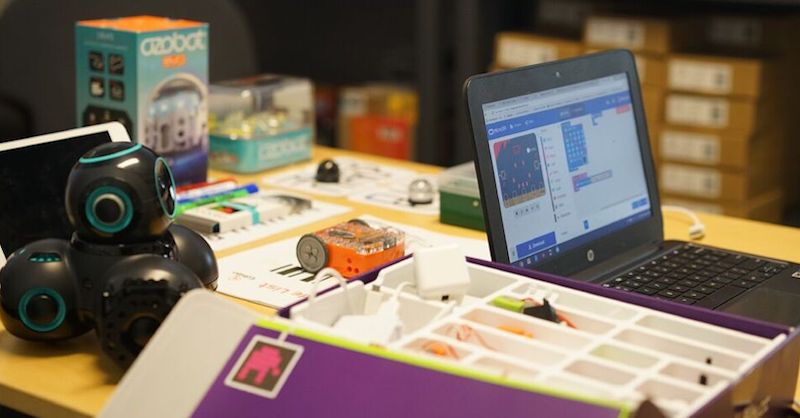Eduporium’s co-founder, president, and CEO, Rick Fredkin, hasn't had what many tech executives would consider a traditional start. That is fine with him, however, because he has found himself in a place that not too many other Black men have: as the head of a technology company. Rick helped to found Eduporium in 2012, and, in the decade since, he's played an integral role in helping our Black-owned business become a trusted name in the STEM education industry. Our mission is rooted in providing educators and students with technology for developing key skills for the real world—skills that Rick gained more unconventionally.
Making a career out of tech skills.
Rick's formal education didn't involve the opportunities to gain practical STEM skills that he's passionate about providing to students today. In fact, he decided he’d had enough of school by ninth grade and found full-time work in the computer industry. He attributes his success in the industry to his childhood access to technology. Rick’s father was very interested in computers, so he'd already picked up many of the skills he would need as a computer professional. He was completely self-taught. His classroom experiences did not provide Rick with the chance to learn tech skills, and he never took a single programming class in school. Nevertheless, his early work with computers helped him progress from basic computing jobs up through the technology industry.
Though Rick was fortunate to have access to technology outside the classroom, many children never have such access. As a result, they lose key opportunities to build the skills that could land them a lucrative role. Plus, access to STEAM tools is often more limited for students of color and those who live in low-income areas. STEM fields remain white male–dominated, and Rick sees economic status as a major cause of this inequality. Economic status typically translates to access, and access will typically translate to opportunity. Thus, depriving students of access to technology can severely restrict their career opportunities.
Accessibility of STEM opportunities.
Rick has always focused on the fact that very few technology businesses have Black founders or leaders. Leading Eduporium through its incorporation, growth, and then eventual certification as a minority-owned business has shown Rick first-hand how technology access can lead to tech careers. Even as Eduporium's mission to provide STEAM opportunities has resonated throughout the education world, Rick realizes that technology access remains far from universal, especially across many marginalized groups. So, Rick and the entire Eduporium team remain committed to continuing to close the access gap.

“STEM education should provide you with a productive life in the future economy,” Rick says. “That’s the way it is. If you have the skills, you have a chance to have a future in tech.”
Rick’s ability to enter and succeed within the STEM economy came directly from his access to technology. That access, however, is simply not equitable across the board. Although a massive amount of technology, software, and hardware is freely available, kids and their parents often aren't aware that it exists. If they do, there’s still a chance they can’t access it because they don’t have a laptop, a desktop, a tablet, or even an Internet connection. The types of economic disadvantages that result in a lack of access to STEAM tools tend to skew towards marginalized groups. They also directly affect the gaps that persist throughout STEM education. Rick recalls being surprised and disheartened about this disparity when he launched Eduporium 11 years ago, and the issue is still ongoing.
“There really is so much technology available right now because of the Internet and many other tools. But, unfortunately, so many people do not even know it exists,” Rick says. “It’s not even necessarily expensive, and some tools are free. The opportunities aren't being utilized because there isn't nearly enough visibility without reliable Internet access. They might only be easy for a tech-savvy person or someone in the tech industry to find. But so many parents and children wouldn’t even know where to look or what to do.”
Knowing that these access and opportunity gaps persist and affect students of color disproportionately is disheartening and troubling. As a Minority Business Enterprise, our whole team cares deeply about these inequalities. Addressing how the education system fails certain students is key to reversing this trend.
Changing the narrative and expanding STEM access.
So, what can we do?
“Let’s talk about STEM education. Contact us,” Rick says.
We want to help parents, teachers, and students themselves shrink the access gap. But, beyond all that, we want to provide more students of all backgrounds with access to STEAM tools. This could ultimately be what helps them build interest in pursuing the exciting and lucrative STEM careers. Also, we want to create and optimize innovative pathways that help close these gaps for good—not only for the most well-off kids in the most well-off districts but for all students.
That's why we offer our monthly technology grant, which helps educators afford 21st-century tech tools and expand access to STEAM opportunities in their classroom. We prioritize educators who have financial need or who have a clear plan for implementing new STEM tools, so we can ensure that students will have direct and beneficial access to this technology. And, we explore both our own offerings and free STEAM solutions on our blog, providing teachers and parents with tips on what's out there and how to use it.

“We want to provide a solution and let everyone know what to use in order to build these tech skills. In the process, we want to provide discovery and technology access for every student—especially those who are underrepresented,” Rick says. “Just getting a computer can unlock access to so much free software and a lot of content. It's more of a productive technology that kids can use to build skills and build a career.”
Using experience to help others succeed in STEM.
For Rick and the Eduporium team, it all comes back to his first-hand story. People often ask why we were founded. A common answer is that we don’t want children left behind because they don’t have affordable access to technology. Rick left school because the system was failing him. For far too many students, this continues today because they don't have the opportunities they need to be successful in today’s world.
Access to STEM experiences and enriching technology is still a pervasive problem in the education world, but it’s especially troubling for students from marginalized groups. The opportunity to participate in STEM programs is not a guarantee. When students are denied these opportunities starting early in their lives, it’s a systemic failure. It only makes getting into college tougher and will continue to hurt them as they explore career options.
Eduporium has been a certified Black-owned Minority Business Enterprise in Massachusetts for several years. With that MBE certification, we continue to do our utmost to ensure that every student gets to enjoy learning opportunities that prepare them for the future with universal availability like they deserve. If this is something you see, too, we’d love to work towards a creative solution together.
Also, if you are looking to increase technology access in your school or classroom, we’re happy to provide recommendations. Our team can set up a call or video chat any time. You can reach us by phone at 1 (877) 252-0001, through email, or through our website. Explore our store for more on the technologies that we provide for creating equity in STEM education. And, follow us on Twitter or Instagram for more updates.




Sorry and disappointed to recently read of the death of your father. We were in high school together until he left before graduation and disappeared into the Air Force. From our infrequent conversations, over the years I think your father, would have been pleased with what you have become / atttained and contributed
I last saw you as an infant in 1982, in your mother’s arms. And Congratulations particularly to you on all that you have attained and contributed in society and the political/educational arena.
you have reached a role and contribution that your father does not reach with his focus on more pure mathematics and science. I have spent much of my life in politics, and know how much that kind of quiet work that you have been doing, is crucial
Alan